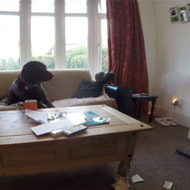
Many owners putting their pets at risk
To mark electrical safety week (9-15 November) UK charity Electrical Safety First has launched a campaign to raise awareness of the risk of electrical fires to pets.
The campaign is a result of research by the charity which found that around 60,000 people in the UK have lost their pets in electrical fires.
Almost two-thirds of pet owners admitted to leaving mobile phones charging unattended or leaving the washing machine or dishwasher to run while they are asleep.
Furthermore, one in 10 admitted to leaving portable heaters switched on unattended, which is particularly dangerous with pets running around and likely to knock things over.
Emma Apter, head of communications at Electrical Safety First, said: “Pets are a part of the family and nobody wants to think of them helpless in the event of a fire.
"During Electrical Fire Safety Week, we would like to encourage everybody to help keep their pets and the whole family safe by taking simple steps to improve the electrical safety in their homes that will help prevent fires and the devastation and upset that they can cause.”
Earlier this year, Elsie Van der Steen, 85, was left with just her cat Pipsy, a chicken, and the clothes on her back after an electrical fire ripped through her home. The fire was caused by a portable heater that had been plugged into an extension lead, overloading the socket. After hearing about the tragic incident, Elsie’s neighbour led a community campaign that has so far raised about £10,000 to rebuild her home.
The safety campaign is backed by Battersea Dogs and Cats home who are joining Electrical Safety First in advising pet owners to look out for potential fire hazards in the home.
Carly Whyborn from Battersea Dogs & Cats Home said: “It’s frightening to think how many fires in homes are unwittingly started by electrical appliances being left unattended.
"Battersea urges all pet owners to protect themselves and their pets, especially as we enter the winter months. Stay alert to any potential risks in your home and keep everyone safe, including your pet.”
Electrical Safety First has produced a short video showing what a dog or cat might get up to when left at home alone. To watch the film and follow the charity's advice on the simple things that can be done to reduce the risk of electrical fires, visit www.electricalsafetyfirst.org.uk/petshomealone.



 The Veterinary Medicines Directorate (VMD) is inviting applications from veterinary students to attend a one-week extramural studies (EMS) placement in July 2026.
The Veterinary Medicines Directorate (VMD) is inviting applications from veterinary students to attend a one-week extramural studies (EMS) placement in July 2026.